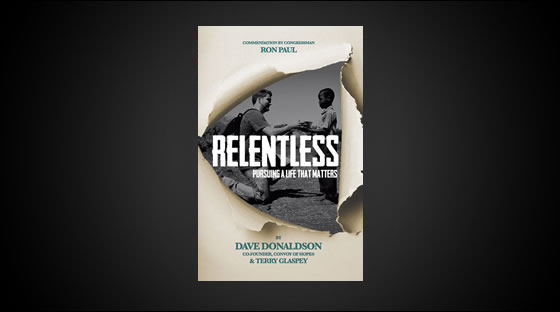Relentless was written by Dave Donaldson, co-founder of Convoy of Hope and President of Charity Awards International. In his book, Donaldson encourages every day people to pursue a life that matters, specifically in caring about the least of these in our world. The “Relentless” (aka world-changers) are those who take personal responsibility to fight injustice, hold charities accountable for how they work, and are passionate about serving local leaders and strengthening the church to accomplish this work.
There are several reasons to read Relentless. Donaldson does a great job emphasizing the need for true compassion in the business of changing the world. “To have compassion for people, we must be with people.” Being “with” people is more than just mailing in a check or loving from afar. It’s messy and often calls us to a life of sacrifice. We were made to be with people. Without true compassion, we can’t expect change to happen.
Another strength of Relentless is the use of story. Donaldson tells stories from his time in the Mathare Valley slum of Kenya, his nonprofit’s work out in the communities of the US, and also his personal story of growing up poor. The stories are memorable and strengthen his call to action. I’ve heard Dave’s brother, Hal Donaldson (the other founder of Convoy of Hope), also use the imagery of “the kids on the other side of the fence” when speaking of the poor who are still waiting for help. This effective mental picture isn’t meant to dismay us–it’s a wake-up call showing us the means to help are within our power.
Where the stories in this book were a strength, the chapters full of stats on hunger, water, homelessness, the overlooked elderly, etc put the central message of Relentless in danger of being weakened. The strength of books like Relentless isn’t in its compelling description of poverty facts; it’s in its stories of real people and experiences that compel action.
If you’ve read more than three books on poverty fighting, you’ll see what I mean. Many of these books start with a strong premise and call to action, but get distracted making lists of facts and figures instead of kicking people in the butt to act (which often times is what is needed more). In the words of Jonathan Gottschall, “Humans simply aren’t moved to action by ‘data dumps,’ dense PowerPoint slides, or spreadsheets packed with figures. People are moved by emotion. The best way to emotionally connect other people to our agenda begins with ‘Once upon a time…'” Luckily, even the stats-heavy chapters in Relentless have lots of great stories, and the final chapters get back on course and encourage readers to make a strong commitment to fighting for others.
Relentless is worth the read alone to learn about the thoughtful and excellent work of Convoy of Hope. Check it out if you need a boost of encouragement and a reminder of why we keep fighting for others.


It is true that it is very easy to be insulated from the difficult, sometimes life-threatening, daily realities others face. It deeply affects us when we experience the environments they live in and the challenges they face.
It can and should cause us to reflect and ask ourselves how each of us can make a difference each with the opportunities we’ve been given.
I’m looking forward to reading the book. Thanks for the review!